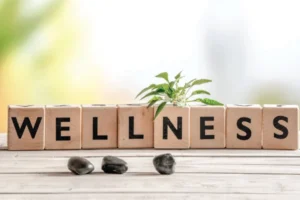Health isn’t achieved overnight; it’s the result of small, daily efforts. Daily well-being means making healthy choices for both your body and mind and maintaining balance in all aspects of your life. By developing simple, healthy habits, you’ll likely gradually feel better, perform better, and connect better with others. By focusing on your daily routine and choosing healthier foods, you can live a fuller and more vital life without feeling overwhelmed.
Eat Healthy to Nourish Your Body
Eating a healthy, balanced diet is one of the best things you can do for your health. The food you eat nourishes your body, so making smart choices can have a huge impact on your energy and long-term health. Eating a variety of unprocessed foods, such as fruits, vegetables, whole grains, lean proteins, and healthy fats, helps strengthen your immune system, improve your digestion, and increase your energy levels. Reducing your intake of processed foods, excess sugar, and unhealthy fats helps your body function better. When you develop healthy eating habits every day, you’ll feel more relaxed, have more energy, and be better equipped to face life’s challenges.
Stay Active
Exercise doesn’t always mean intense exercise; it can be as simple as incorporating more movement into your daily routine. Walking, stretching, cycling, and even dancing can improve your heart health, build muscle, and maintain your flexibility. Regular exercise is better than overdoing it. Even short daily activities can improve circulation and relieve stress. Making exercise part of your daily routine benefits your long-term health and helps you maintain a healthy weight. Staying active every day boosts your self-confidence and allows you to enjoy life with more energy.
The Importance of Adequate Sleep
Getting enough quality sleep is another important habit for maintaining good health. Sleep helps your body recover and prepares you for the next day. Insufficient sleep can lead to difficulty concentrating, making decisions, and even mood swings. Seven to eight hours of quality sleep a night is good for your mood, memory, and overall well-being. Developing a calming bedtime routine, reducing screen time before bed, and maintaining a consistent bedtime are all simple strategies for better sleep. Making sleep a priority in your healthy habits will reap lasting benefits.
Mindfulness as a Way to Manage Stress
Stress is a common part of life, but knowing how to manage it healthily is crucial. Mindfulness, meditation, or breathing techniques can help you relax and prevent excessive stress from damaging your health. Taking short breaks during the day, going outside, or pursuing a relaxing hobby can also help restore your emotional balance. You can manage stress healthily, maintain mental clarity, and avoid the negative health effects of chronic stress. Integrating mindfulness into your daily routine can make you more resilient and emotionally stronger.
Drink Enough Water for Better Health
Drinking enough water is one of the simplest and most beneficial things you can do for your health every day. Drinking enough water promotes digestion, keeps your body temperature stable, and ensures steady energy levels. Even mild dehydration can cause fatigue, headaches, and difficulty concentrating. Carrying a water bottle, drinking water with meals, and choosing water over sugary drinks can significantly improve your health. Staying hydrated is also good for your skin, kidneys, and overall body function. Drinking enough water keeps your body functioning optimally all day long.
Build Strong Social Connections
Health isn’t just about your physical and mental well-being; it’s also about the connections you make with others. Building strong social connections with family, friends, and others in your life provides emotional support and contributes to your overall happiness. Sharing your experiences, spending time with people you care about, and having deep conversations can help you feel less lonely and stressed. Good social connections give you a sense of belonging and are beneficial for your mental health. Spending time building relationships is a good habit that can make life more enjoyable and fulfilling.
Avoiding Harmful Daily Habits
Being aware of potentially harmful habits is also part of maintaining your daily well-being. Excessive smoking, excessive drinking, overeating, or excessive screen time can gradually damage your physical and mental health. Replacing detrimental habits with good ones makes it easier to live a balanced life. For example, replacing processed snacks with fruit, reducing late-night screen time, or replacing harmful drinks with water are all gentle but effective changes. To break bad habits and make room for good ones, you need to be aware of them and practice self-discipline.
Take Care of Yourself Regularly
Many people forget to take care of themselves, but self-care is an important part of maintaining your health. Staying energetic and balanced isn’t selfish. Reading, journaling, exercising, or taking up a hobby are all beneficial ways to take care of yourself and recharge. Setting boundaries, saying “no” when necessary, and making sure you don’t overload yourself with responsibilities are all part of self-care. Taking care of yourself daily can help you prevent burnout and improve your physical and mental health. By taking care of yourself first, it becomes easier to care for others and cope with daily challenges.
Conclusion
Daily healthy habits are the key to a better and happier life. You can develop a balanced daily routine that benefits both your physical and mental health by paying attention to your nutrition, exercise, sleep, and how you manage stress. Staying hydrated, building healthy relationships, avoiding harmful habits, and taking time for self-care are all simple ways to be healthier and happier. The key is to be patient and maintain these habits until they become a lifestyle. These small daily actions will, over time, lead to a more vital, positive, and healthy life.
FAQs
1. What is the easiest healthy habit to start?
Drinking enough water every day is the easiest way to develop a healthy habit because it will make you feel better immediately and improve your overall health.
2. How can I maintain my healthy habits?
Start small and develop one or two habits at a time. Gradually expand them until they become part of your daily routine.
3. Does exercise have to be intense to be healthy?
No, even light exercises like walking, stretching, or cycling can be beneficial if done regularly.
4. Why is getting enough sleep important?
Sleep is important because it helps your body rest, recover, and prepare for the next day, which directly impacts your physical and mental health.
5. How long does it take for daily healthy habits to show results?
Effects vary, but many people feel better after a few weeks if they stick with it.




